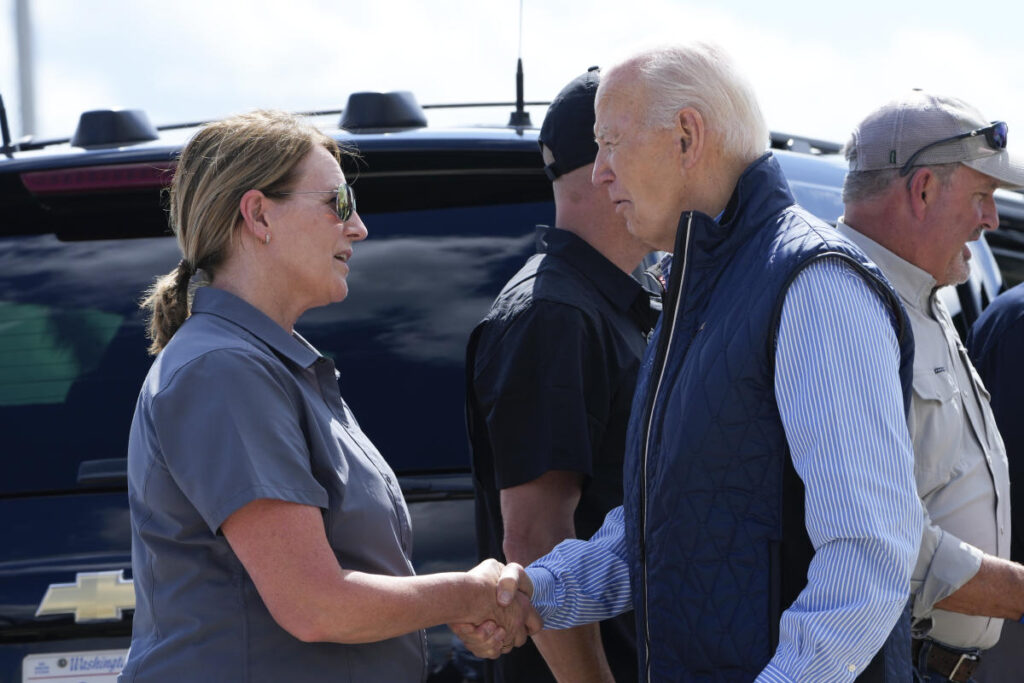The U.S. government’s disaster relief efforts have been recently overshadowed by a wave of misinformation and conspiracy theories surrounding the federal response to Hurricane Helene, particularly claims propagated by former President Donald Trump. Deanne Criswell, the administrator of the Federal Emergency Management Agency (FEMA), expressed her dismay at how this rhetoric is adversely affecting both aid workers and the communities in need. She emphasized that such accusations undermine the essential work of relief organizations dedicated to assisting those affected by the hurricane, especially in hard-hit areas of North Carolina. Criswell’s assertion highlighted the critical need for unity in disaster response rather than allowing political narratives to dictate the discourse surrounding relief efforts.
The controversy has escalated in the wake of claims from Trump and other Republicans that the federal government has been withholding aid from areas that lean Republican. Critics have suggested that instead of assisting citizens in need, FEMA is redirecting funds to support undocumented immigrants, foreign countries like Israel and Ukraine, or engaging in other budget misappropriations. Keith Turi, acting director of FEMA’s Office of Response and Recovery, countered these allegations by stating that FEMA currently has adequate funding in place for the recovery from Hurricane Helene, safeguarded by a recent congressional allocation of $20 billion, of which $8 billion is specifically earmarked for recovery from previous storms.
Additionally, far-right extremist groups have fueled wild theories that government officials intend to forcibly relocate storm-affected residents and repurpose their land, exacerbating fears within these vulnerable communities. Congresswoman Marjorie Taylor Greene’s unfounded claim that Helene was manipulated via weather technology to target Republican voters has further intensified concerns and skepticism among affected populations. Criswell addressed this troubling trend, describing the effect of these baseless narratives as harmful, contributing to an atmosphere of distrust that inhibits residents from seeking necessary assistance during a time of crisis.
The destructive impact of Hurricane Helene cannot be overstated, with the storm causing extensive damage in numerous states, resulting in a death toll that reached at least 230. Criswell remarked on the importance of local officials in countering the spread of misinformation, emphasizing that the danger lies in jeopardizing efforts to provide aid and support where it is needed most. The narratives surrounding the governmental response have the potential to dissuade individuals from registering for help, which ultimately hampers recovery efforts and prolongs the suffering of those impacted by the storm.
President Joe Biden reinforced the administration’s commitment to collaborative recovery efforts, stressing that cooperation with local and state leadership transcends partisan lines. His administration aims to ensure that support reaches all affected communities, focusing solely on healing and rebuilding rather than becoming engulfed in politically charged disputes. This dedication to an effective recovery process underscores the importance of a coordinated response that prioritizes the needs of citizens over political agendas.
As FEMA prepares for the impending Hurricane Milton, which has been rapidly on the rise, efforts are underway to strategize and secure necessary resources for Florida’s recovery. Criswell indicated that proactive engagement with the state is crucial to ascertain anticipated needs, ensuring that preparedness measures are in place before the storm’s landfall. This emphasis on readiness highlights FEMA’s ongoing commitment to disaster response while underlining the critical impact of dispelling misinformation to restore public trust in governmental support systems during crises.

